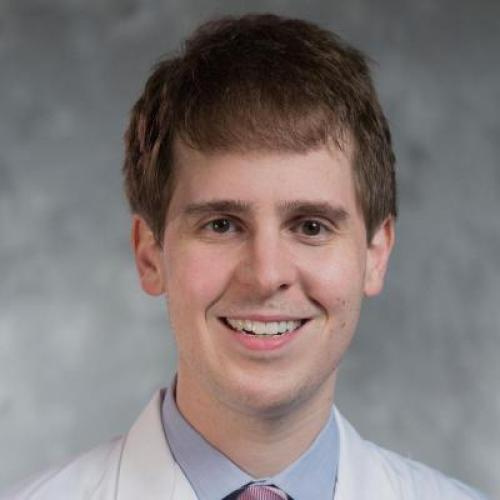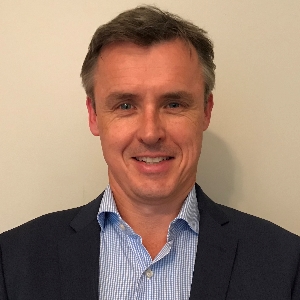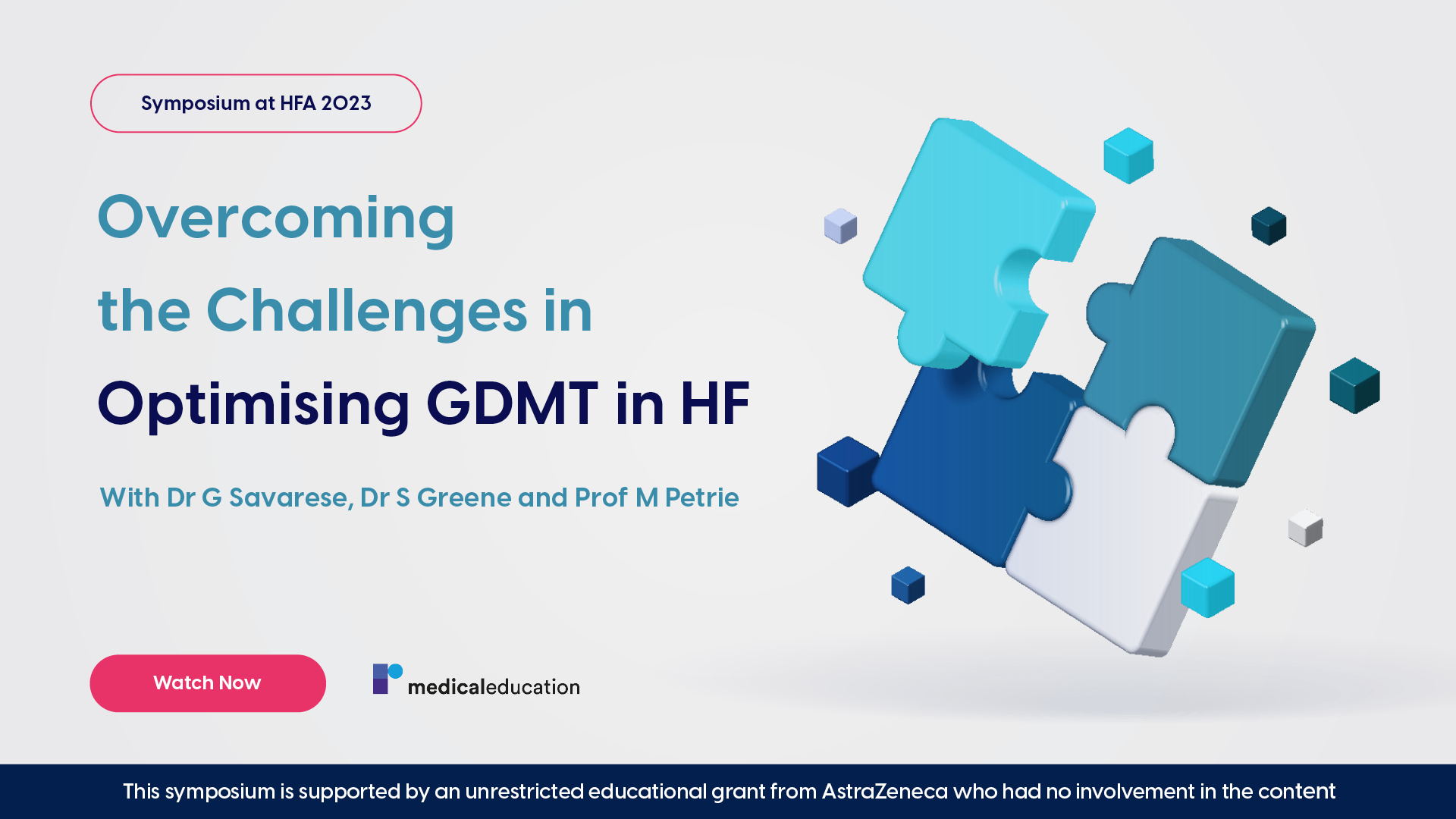Overcoming the Challenges in Optimising GDMT in Heart Failure
Published: 02 June 2023
-
Views:
 43022
43022
-
Likes:
 7
7
-
Views:
 43022
43022
-
Likes:
 7
7
Overview
Radcliffe Medical Education bring together a globally-renowned faculty, including Dr Gianluigi Savarese (Karolinska Institute, Stockholm, SE), Dr Stephen Greene (Duke University School of Medicine, North Carolina, US) and Prof Mark Petrie (University of Glasgow, Glasgow, UK) for a programme centred around the implementation of guideline-directed medical therapy (GDMT) in heart failure (HF).
During this session, the panel discuss key aspects related to GDMT in heart failure including the importance of promptly initiating GDMT in heart failure patients and the challenges and barriers that exist in implementing GDMT in clinical practice. Further, they provide insights into effective strategies and approaches for overcoming barriers to GDMT initiation.
The programme also features short interactive video presentations and polls to provide you with practical knowledge and tools to implement GDMT effectively in your clinical practice.
Presented, and recorded, at HFA 2023 in Prague, CZ.
Key Learning Objectives
- Appraise the urgency needed in rapid initiation of GDMT to improve HF outcomes.
- Recognise barriers preventing the use of GDMT in current practice.
- Identify strategies needed to drive implementation of GDMT in clinical practice.
Target Audience
- Cardiologists
- Heart Failure Specialists
- Primary Care Physicians
- Nurses, Pharmacists
- Other Allied HCPs
More from this programme
Part 1
The Urgency to Implement GDMT
In this first session, the panel delve into the urgency of implementing GDMT for patients with heart failure. By examining a typical HFpEF patient journey, they highlight the importance of timely intervention and discuss their pharmacological approach.
| 1 session | |
| The Urgency to Implement GDMT | Watch now |
Part 2
Barriers to Achieving Optimal Medical Therapy
In this session, our panel engage in a thought-provoking discussion about the barriers that impede the achievement of optimal medical therapy. Using another patient journey, they carefully examine whether these barriers are real or perceived and aim to shed light on the true nature of these obstacles.
Part 3
Practical Strategies to Implement New Algorithms in GDMT
In the final session, we hear a short interview with Dr Julio Núñez (University of Valencia, ES) who shares his valuable insights and personal experiences as an implementer. Dr Núñez provides real-world examples of successful implementation, highlighting effective approaches that have proven instrumental in achieving optimal outcomes. By drawing from his experiences, the panel aims to equip attendees with practical strategies to navigate the complexities of implementing new algorithms in GDMT and improving patient care.
Part 4
Audience Q&A
In the concluding segment of the symposium, the panel open the floor to questions from the audience and reflect on a final question: "What is the one thing you would change tomorrow in your clinical practice to improve GDMT in heart failure?" Each panelist shares their unique perspective, offering insightful suggestions for immediate action to improve patient outcomes.
| 1 session | |
| Audience Q&A | Watch now |
Faculty Biographies

Gianluigi Savarese
Associate Professor of Cardiology
Dr Gianluigi Savarese is currently an Associate Professor of Cardiology and Heart Failure Specialist at the Karolinska Institute in Stockholm, Sweden.
Dr Savarese has served on the board for the European Society of Cardiology's Heart Failure Association since 2020, and has previously been a Nucleus member of a working group on Cardiovascular Pharmacotherapy for the ESC. He is a member of the Italian Society of Cardiology, and the Swedish Society of Cardiology.
Dr Savarese attended the University of Naples Federico II University for his degree in Surgery and Medicine between 2004 - 2010. He then went on to stay at the same institution until 2016 as he completed his Specialism in Cardiovascular Diseases. He then continued his postgraduate studies at the University of Zurich between 2015-2017, where he continued his studies into Heart Failure. Finally, Dr Savarese completed his PhD at the Karolinska Institutet in 2018.
Dr Savarese…

Stephen J Greene
Assistant Professor, Advanced Heart Failure & Transplantation
Dr Stephen Greene is Assistant Professor in Advanced Heart Failure & Transplantation at The Duke University School of Medicine in Durham, North Carolina, US.
Dr Greene is a cardiologist with a clinical and research interest in heart failure. His research interests are focused on strategies and therapies to improve outcomes and quality of life for patients with heart failure. This involves research through clinical trials and through examining data from real-world clinical practice.

Mark Petrie
Professor/Honorary Consultant (Institute of Cardiovascular & Medical Sciences)
Prof Mark Petrie is Professor of Cardiology in the Institute of Cardiovascular and Medical Sciences at the University of Glasgow, UK. Prof Petrie started his studies as an undergraduate at Edinburgh University, before training in cardiology in Glasgow. He worked as a heart failure and interventional cardiologist for many years before transferring to the University of Glasgow in 2016.
Prof Petrie's research interests focus on diabetes and cardiovascular disease in heart failure, structural intervention and revascularization in heart failure, peripartum cardiomyopathy, microvascular disease in heart failure with preserved ejection fraction, postmyocardial infarction cardiac remodeling, iron in heart failure, and cardio-oncology. While Prof Petrie has many research interests, he also takes pleasure in mentoring future high-caliber cardiologists and has supervised many outstanding individuals during their PhDs and MDs.







Comments